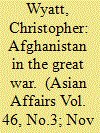| Srl | Item |
| 1 |
ID:
142531


|
|
|
|
|
| Summary/Abstract |
The period of the Great War in Afghanistan was one of the most transformational periods of her entire history. Less than a year after the end of the Great War, both Afghanistan and her relations with the rest of the world had changed forever. The article covers Afghanistan and the outbreak of war, the Niedermayer-Hentig mission from Germany, pressure on the frontier and at court, and the aftermath of the Assassination of Amir Habibullah. At Kabul, the emergence of a ‘War Party’, which favoured the declaration of war on India on the side of the Central Powers, caused difficulties for Habibullah's attempt to remain neutral. Although the War Party was to have some support from the Niedermayer-Hentig Mission to Kabul, it was never strong enough to act until the Great War itself was over. On the other side of the frontier, the tribes were expecting to be called to fight at any moment. Keen to raid into the plains, they initially moved too early and were rebuffed but low-level tribal activity took place all over the frontier, though not at the intensity seen in previous large uprisings. At the same time, the Indian Army was taking out the best troops to send to Europe and other fronts, leaving a comparatively small force to protect the frontier. Large scale response to tribal raiding was not possible but the Indian Army was able to deploy aeroplanes, artillery and machine guns as force multipliers to help make up for the lack of fighting men. The cumulative experience was one of change which needed to be understood and accommodated in short order. Men like Sir Denys Bray of the Foreign Department and Mahmud Tarzi and Abdul Quddus Khan in Kabul were able to do this and, in so doing, facilitated Afghanistan's emergence to independence and nationhood.
|
|
|
|
|
|
|
|
|
|
|
|
|
|
|
|
| 2 |
ID:
148021


|
|
|
|
|
| Summary/Abstract |
In the imaginations of many, war in British India had its focus on the North-West Frontier and was fought against the tribes of that region. However, British thinking about Indian defence involving Afghanistan underwent tremendous change over the period under consideration. British plans to meet a Russian invasion on the Kabul-Kandahar Line in 1904 resembled those of any other Nineteenth Century Imperial campaign, with numbers of infantry and cavalry still being thought of and referred to as bayonets and sabres. Twenty years later, heavily influenced by the experiences of the Great War in the region and the Third Afghan War and associated operations, the calculus was different with logistics changed by motor vehicles and the introduction of what today are referred to as force multipliers, such as aeroplanes and machine guns. It was over this period that warfare as fought and conceptualised by men like Napoleon gave way to modern practices familiar to us today.
|
|
|
|
|
|
|
|
|
|
|
|
|
|
|
|